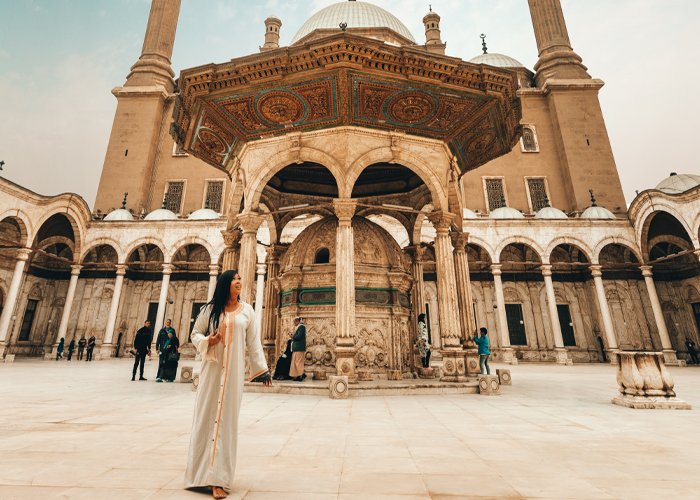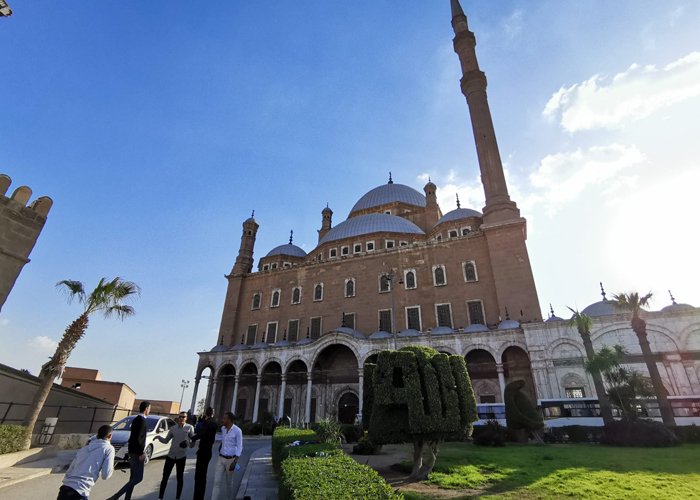Mosque of Muhammad Ali: Egypt’s Crown Jewel of Islamic Architecture
The Mosque of Muhammad Ali dominates the skyline of Cairo and commands attention with its grand design, historical depth, and symbolic power. Also known as the Alabaster Mosque, it was commissioned by Muhammad Ali Pasha, a key figure in modern Egyptian history, and completed in the mid-1800s.
Set within the historic Citadel of Saladin, this mosque is not only a place of worship but a national monument. In 2025, it continues to be a must-visit destination for travelers drawn to Egypt’s layered narrative of power, faith, and art.
Historical Background of the Mosque of Muhammad Ali
Built between 1830 and 1848, the mosque was a personal and political project of Muhammad Ali Pasha, the ruler credited with founding modern Egypt. He intended the mosque to serve as both his legacy and his final resting place. His alabaster tomb lies within the prayer hall, a reminder of his pivotal role in Egypt’s evolution.
The mosque also symbolized a shift toward Ottoman influence, evident in its resemblance to Istanbul’s great mosques. It was constructed on the ruins of earlier Mamluk structures, reflecting the transition in Egypt’s architectural and political leadership.

Architectural Highlights
The Mosque of Muhammad Ali is one of the most visually striking mosques in the Middle East. Its grand proportions and elegant symmetry draw from classical Ottoman design. The central dome rises to 52 meters, flanked by two slender minarets that pierce the Cairo sky.
Key architectural features include:
- Alabaster-Clad Walls: The mosque is often called the Alabaster Mosque due to its extensive use of this creamy, light-reflecting stone.
- Spacious Courtyard: Featuring a central ablution fountain and surrounded by elegant arcades.
- Stained Glass Windows: Adding color and warmth to the interior.
- Prayer Hall: Vast and ornate, with hanging chandeliers and carpets that welcome worshippers and visitors alike.
In 2025, preservation efforts continue to maintain the mosque’s magnificence while allowing better accessibility for international visitors.
Religious and Cultural Role
While it is no longer Cairo’s main place of worship, the mosque remains an essential stop for those interested in Egypt’s Islamic heritage. It represents a fusion of religion, nationalism, and artistry. Inside, the atmosphere is serene, with soft light filtering through stained glass, casting a peaceful glow on visitors and worshippers.
The mosque is a centerpiece of Cairo’s Islamic culture and one of the most photographed sites in Egypt. For many, it marks the beginning of a broader spiritual journey through Islamic Cairo.
Visiting the Mosque of Muhammad Ali in 2025
Travelers in 2025 will find the mosque more accessible than ever, thanks to infrastructure improvements and guided tour options offered through reputable Egypt tours.
Helpful tips for a rewarding visit:
- Timing: Early morning or late afternoon visits offer the best light and fewer crowds.
- Dress Code: As with all mosques, modest clothing is essential.
- Guided Tours: Opt for a knowledgeable guide to better appreciate the historical and cultural context.
- Citadel Complex: Combine your visit with nearby sites such as the National Military Museum and the Mosque of Sultan Al-Nasir Muhammad.
Don’t forget to pause at the mosque’s terrace, which offers stunning panoramic views of Cairo, stretching as far as the Pyramids on a clear day.
Surroundings: The Citadel and Beyond
The Mosque of Muhammad Ali is housed within the Citadel of Saladin, one of Cairo’s most important historical sites. Built in the 12th century to protect against Crusaders, the Citadel has served as a seat of power for centuries.
Besides the mosque, the Citadel complex includes several museums and mosques, providing a full-day itinerary for culture lovers. Just beyond lies the vibrant heart of Islamic Cairo, with attractions like Al Azhar Mosque, Khan El Khalili Bazaar, and Al-Muizz Street.
Why It Matters in 2025
In today’s rapidly changing world, the Mosque of Muhammad Ali stands as a symbol of permanence and identity. It reflects a key chapter in Egyptian history—the modernization movement under Muhammad Ali—and provides insights into the spiritual and architectural ambitions of that era.
As global interest in cultural travel rises, 2025 is an excellent year to explore this heritage site. From historical depth to architectural brilliance, the mosque offers a well-rounded experience for travelers seeking more than just sightseeing.

Photography and Etiquette
Photos: Allowed in most areas but always ask if unsure.
Respectful Behavior: Maintain quiet inside prayer halls.
Shoes Off: Required before entering carpeted prayer areas. Bags are often provided.
Local Interaction: Engage respectfully with locals and staff; many are happy to share stories or history.
Travel Recommendations and Tour Options
Whether you’re arriving from a Nile cruise or flying in directly to Cairo, organizing your itinerary through experienced agencies ensures a smoother journey. Many Cairo travel packages include the Mosque of Muhammad Ali along with other highlights of Egyptian history and culture.
Pairing this visit with trips to Islamic Cairo, the Egyptian Museum, or even a day excursion to Saqqara provides a complete understanding of Egypt’s deep-rooted identity.
Nearby Attractions to Enrich Your Trip
- Mosque of Ibn Tulun: Egypt’s oldest functioning mosque with unique spiral minaret.
- Sultan Hassan Mosque: Considered an architectural masterpiece.
- Museum of Islamic Art: Home to rare Islamic artifacts from across the Muslim world.
- Khan El Khalili: A bustling bazaar with souvenirs, spices, and local crafts.
These sites are all within a short drive, perfect for building a rich and immersive cultural itinerary.
Final Thoughts
The Mosque of Muhammad Ali is not just a historical site—it’s a profound cultural experience. It tells a story of ambition, reform, and faith that shaped modern Egypt. In 2025, visiting this mosque means engaging with a legacy that continues to inspire.
From its imposing minarets to its quiet tomb, from the sweeping views to the spiritual atmosphere, every corner of the mosque invites reflection. Whether you are a first-time visitor or returning to deepen your understanding, this landmark promises memories that will last a lifetime.
Relevant Keywords Included Naturally: Islamic Cairo, Al Azhar Mosque, Egypt tours, Cairo travel, Muslim world, travel to Egypt, religious institutions, Egyptian history, Egyptian culture, 2025, spiritual journey, historic mosques in Cairo, Islamic architecture in Egypt.




